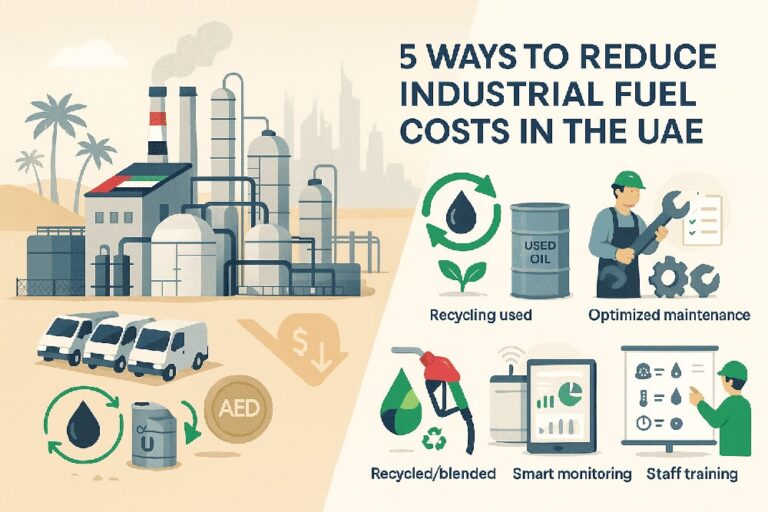Industrial fuel expenses are one of the highest operational costs for factories and transport companies across the UAE. With rising global oil prices and stricter environmental regulations, businesses are actively seeking ways to reduce industrial fuel costs without compromising productivity.
This article highlights five effective and realistic strategies that can help UAE companies cut fuel expenses from recycling used oils to adopting modern energy management systems.
1. Recycle and Reuse Used Lubricants
Recycling used lubricants is one of the most efficient ways to lower industrial fuel expenses.
Companies like Safeenat Al Sharq specialize in used lubricant collection and recycling, converting waste oils into reusable industrial fuels.
Re-refined oil maintains similar performance levels to virgin oil while costing significantly less.
Benefits:
Reduces the cost of purchasing new fuel.
Minimizes waste disposal expenses.
Supports sustainability goals and UAE environmental regulations.
2. Optimize Machinery Maintenance
Poorly maintained machines consume more fuel and generate more heat.
Regular maintenance ensures that engines and mechanical systems run efficiently, reducing fuel wastage.
Simple actions like timely oil changes, filter cleaning, and calibration checks can significantly impact total fuel use.
Quick Tips:
Use high-quality lubricants suited for your equipment.
Replace filters as per manufacturer guidelines.
Monitor engine performance with IoT-based tools.
3. Switch to Recycled or Blended Industrial Fuel
Switching from conventional fuels to recycled or blended fuels can lower costs by up to 20–30% without affecting output.
These alternative fuels, produced from treated waste oils, are environmentally friendly and fully compliant with UAE regulations.
Why it works:
Recycled fuel burns cleaner and lasts longer.
Lowers emissions and aligns with sustainability goals.
Often available locally at lower transportation costs.
4. Monitor Fuel Consumption with Smart Systems
Digital monitoring systems help identify patterns of fuel usage and detect waste.
Using smart meters, IoT sensors, and AI-based analytics, companies can track consumption in real time and adjust operations accordingly.
Practical Example:
A transport company in Abu Dhabi reduced its diesel usage by 18% after installing automated monitoring systems that detected idling times and inefficiencies.
Implementation Tip:
Integrate fuel tracking data with maintenance schedules to optimize performance.
5. Train Your Staff on Energy Efficiency
Human behavior plays a major role in energy consumption.
Training operators and supervisors to follow efficient fueling and maintenance practices can reduce overall costs dramatically.
Key Focus Areas:
Avoid unnecessary idling.
Ensure optimal operating temperature.
Follow proper storage and handling of fuel.
Encourage reporting of leaks and inefficiencies.
Cutting down industrial fuel costs in the UAE doesn’t require massive investments. it requires smart strategies and sustainable practices.
From reusing recycled lubricants to adopting digital fuel monitoring and staff training, each step contributes to long-term savings and environmental responsibility.
At Safeenat Al Sharq, we help UAE industries achieve these goals through licensed used oil collection, recycling, and industrial fuel supply — combining sustainability with efficiency.



